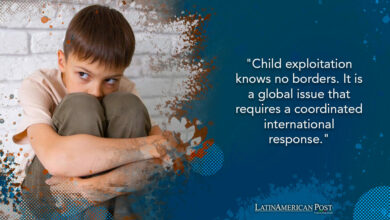Colombia: is peace threatened by a former guerrilla leader?
With the capture of Jesus Santrich for drug trafficking, the Havana agreements face their first test of fire
For Jesus Santrich, the demobilization and the road to the Congress of the Republic suffered the greatest setback. For the now FARC party and for the Colombian government itself, the capture of Santrich implies the first test of fire for the peace agreements.
Leer en español: Colombia: ¿la paz está amenazada por un exjefe guerrillero?
Seuxis Hernandez Solarte, first name of Jesus Santrich, was captured and requested in extradition by the United States on charges of drug trafficking and interpol imposed a red circular against him. The DEA was behind his capture, with a covert operation in which Santrich was followed after his demobilization.
However, beyond the charges for which Santrich was arrested, the real challenge for the South American country is which institution has the competence to judge the ex-guerrilla leader. Santrich is involved in the shipment of 10 tons of cocaine to the United States, at the time of his capture on Monday, April 9, four more people were captured under the same crimes.
The Attorney General of the Nation, Néstor Humberto Martínez, at a press conference, explained that the charges under which the former guerrilla member was arrested were perpetrated from June 2017 until the current month of April. The dates are very important in this case, because according to the most recent ruling of the Constitutional Court, related to the legal framework of the Special Jurisdiction for Peace (JEP, in Spanish), the competition to judge Santrich falls on Ordinary Justice.
Who should judge what?
For the president of the JEP, Patricia Linares, the corresponding section of this framework will study the events for which the leader of the demobilized guerrilla group FARC was arrested. Once all the charges are reviewed and the pertinent investigation is made, the responsibilities that Santrich has with the justice will be determined.
Linares recalls that “if the facts were committed after the date of termination of the conflict, that is, on December 16, 2016, the case should be referred to the ordinary jurisdiction for the pertinent purposes”, so the request for Extradition would then have to be evaluated by the Supreme Court of Justice.
For the director of Human Rights Watch, José Miguel Vivanco, the JEP’s review of the case and its subsequent pronouncement will revitalize the peace process, or it could also be the decline of it. “Only a rigorous and transparent decision will send the message that the JEP has teeth, this may be the first major test of the JEP since its formation.”
Now, if it is confirmed that ordinary justice will judge the former guerrilla leader, the Supreme Court of Justice will have to study the case and analyze the request for extradition. However, who would have the last approval would be President Juan Manuel Santos. The president at a press conference already clarified that, if all the accusations are correct and their authenticity is verified, he would not hesitate to sign Santrich’s departure from the country to the United States for further trial in that nation.
Non-compliance with what was agreed?
The political party of the FARC, in a statement of six points, says that “with the capture of our comrade the peace process is at its most critical point and threatens to be a real failure.” Since the capture of Santrich was known, the hypothesis handled by his party is that it is a “montage”, something that Iván Márquez reaffirmed, during the press conference that took place last Tuesday, April 10.
For his part, the presidential candidate and chief negotiator of the Government during the talks of the peace agreement in Havana, Cuba, Humberto de la Calle, said that with the events of this week “it is demonstrated that the agreement was well negotiated. They cannot continue to commit crimes, that is absolutely clear. The members of FARC must be aware of this, and now they cannot say that something is being done, if it is proven that the crimes committed are after the date of the end of the conflict”.
Latin American Post | Carlos Eduardo Gómez Avella
Translated from “ Colombia: ¿la paz está amenazada por un exjefe guerrillero?”






